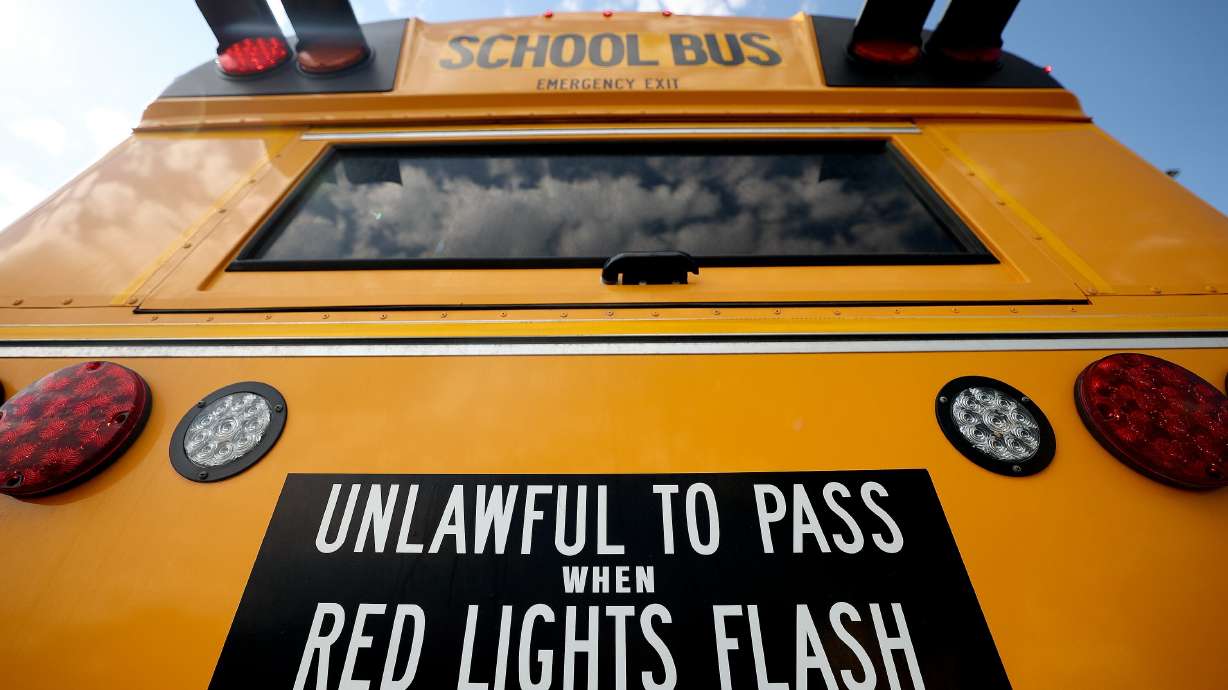Estimated read time: 5-6 minutes
This archived news story is available only for your personal, non-commercial use. Information in the story may be outdated or superseded by additional information. Reading or replaying the story in its archived form does not constitute a republication of the story.
TOOELE — Emily Syphus, a member of the Tooele County School District Board of Education, concedes that in recent years, the Utah Legislature has appropriated education funding that "percentage-wise is historically high."
"And we're grateful for that," she said during a meeting Monday with the editorial boards of the Deseret News and KSL.
But between inflation, unfunded or underfunded mandates, mounting student behavioral issues and hunger, school districts are struggling to meet the growing challenges. She likens it to being asked to throw a dinner party for 100 people and given only $50 to do it.
"They made an amazing dinner party and they've been doing it year after year. But the problem is they're being asked to do more and more with less and less," said Syphus.
"So there's more requirements for the party. There's more people to feed, and the money that they have isn't worth as much anymore. So sooner or later, it's going to be impossible to be able to feed everyone and take care of the way they need to be," she said.
It's not just the funding, it's a shortage of educators, particularly special educators, she said.
There are 99 special education teachers in Tooele County schools but 20 of them are not certified, she said.
"They're working on their Alternative Route to Licensure, and six of them are actually permanent substitutes. So those 26 people are not able to be in charge of caseloads and do all the management of the cases that need to happen, because that's federal law. So those people are not even able to do that," Syphus said.
Despite multiple Utah school districts offering teachers $60,000 salaries to start, fewer college students are majoring in education so there are few university-qualified teachers in the pipeline.
Income tax earmark
In November, Utah voters will decide whether to remove the earmark on state income tax that limits its use to public education, higher education and services for children and people with disabilities. If voters approve an amendment to the Utah State Constitution lifting the earmark, state lawmakers will eliminate the state portion of food tax.
The other legislation that would go into effect if voters approve the constitutional amendment is described as a "hold harmless" measure that would ensure certain state public education funding would remain in place for five to 10 years if enrollment declines as projected.
Legislative leaders say eliminating the earmark would help them address budgeting constraints at a time income tax revenues are rising and revenue from sales tax is contracting.
While none of the five local school board members representing Alpine, Canyons, Davis, Tooele and Wasatch districts took a position on the proposed constitutional amendment on behalf of their respective boards, some said as individual board members, they oppose it.
In addition to inflationary pressures, schools have increasingly become safety nets as educators are pressed into providing some children's basic needs such as food and clothing, oftentimes paying for students' necessities from their own pockets.
There has also been a significant increase in demand for student mental health services and educators reporting behavior problems in their classrooms, said Davis School District Board of Education member John Robison.
"In Davis School District, we've seen a 220% increase in therapy sessions provided to students from 2021-22 school year to 2023-24," he said. Eleven percent more students self-reported on the most recent biennial student survey on health and risk prevention administered by the school district that they're feeling depressed.
'Not a sustainable process'
A teacher mentor has reported that during an average year, she would get three to four requests from a principal to help a veteran teacher with classroom management.
"Last year, she had over 20 requests, so the issues that we see have increased significantly. Our public schools, though, are limited in relationship to the availability of the resources that we need to deal with these problems, that's in programs, and more important manpower," he said.
Utah's exceptional educators are going to find ways to take care of students, he said. "They're going to sacrifice quietly, and they're going to do all they can to meet the needs of the well-being of their students. But there's a significant need ... for the funding that can help them prepare to meet the needs that they're facing," Robison said.
Julie King, a member of Alpine School District's Board of Education, said, "The needs of the students are outpacing the capabilities of the adults and that's not a sustainable process."
Educators and school staff are experiencing trauma from their experiences at school, she said.
"I had a student in one of my schools who attempted to die by suicide in the school and was with self-harming to the point of where staff had to tackle the student and remove a weapon. The staff members went home with a child's blood staining in their clothing," she said.
When students die by suicide, it has a profound impact on fellow students and educators, she said.
"I cannot tell you the physical dynamic it is to go into a classroom where a child used to sit and see an empty chair every day for the rest of the school year. ... We are at a point where if we don't make additional investments into mental health, into the social safety net that schools are doing, if we don't make a significant investment now, there are going to be consequences for decades to come that are going to be incredibly expensive for us," she said.









